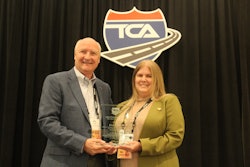Throughout our lives we rely on a multitude of goods and services to prosper as individuals and collectively as a nation, and no industry is more central to that story than trucking.
Today, America's trucking industry is the lifeblood of the U.S. economy and central to our way of life. In fact, nearly every good consumed in the U.S. is put on a truck at some point. As a result, the trucking industry hauls 72% of all freight transported in the United States. As a whole, the trucking industry is a more than $700 billion industry, representing 80% of the nation’s freight bill.
When President Franklin D. Roosevelt signed the Fair Labor Standards Act (FLSA) in 1938, the economy was recovering from the effects of a severe depression. For decades prior, many organizations and individuals believed that by setting “a floor under wages,” and a “ceiling over hours” that would curb or eliminate unfavorable labor conditions. Even though the FLSA guaranteed overtime pay to many workers, the same law has a motor carrier exemption, which says “any employee with respect to whom the Secretary of Transportation has the power to establish qualifications and maximum hours” is not guaranteed overtime pay.
[Related: Legislation to remove overtime-pay exemption for employee drivers follows DOT action item]
According to ZipRecruiter, as of May 2022, the average annual pay for a truck driver in the United States is $51,910 a year. That works out to $24.96 per hour. But ZipRecruiter’s math is just as flawed as the exemption, as the $51,910 figure assumes only 2,080 hours worked during the year, which is an all-inclusive 52-week year at 40 hours per week.
When a driver works 70 hours in eight days as per hours of service rules (assuming two weeks off annually) that driver is actually working 3,071 hours, which reduces their hourly rate to $16.90. Still, that calculation also assumes that there is no unpaid working time, which is a completely false proposition. Finally, when fully accounted, drivers’ wages fail to even meet a $15 per hour minimum wage.
Since Congress passed the FLSA in 1938 that ended the requirement for overtime pay differentials for truck drivers for all hours worked beyond 40 hours per work week, we have effectively subsidized transportation costs at the sole detriment of truck drivers’ earnings. The easy, economically viable and socially equitable solution is to eliminate the overtime pay exemption under the FLSA.










